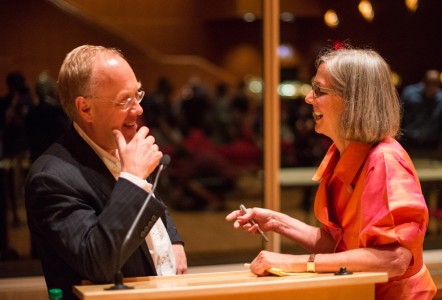Pulitzer Prize-winning journalist Chris Hedges ruffled some feathers and turned some heads during his talk, “War is the Force that Gives Us Meaning” in JRC 101 on Tuesday, Sept. 17.
The Rosenfield Program and the Center for the Humanities collaborated to bring Hedges to Grinnell as part of the Center for the Humanities’ yearlong series: “A Century of War: 1914 and Beyond.”
While Hedges discussed different aspects of war, such as the military-industrial complex and drone warfare, he also looked into other topics like climate change, the Occupy movement and the role of corporations in America.

Photo by John Brady
Hedges is known as a journalist and also for publishing several books, but perhaps is most famous for suing members of the U.S. government in the lawsuit Hedges v. Obama. Hedges claimed that part of the National Defense Authorization Act was unconstitutional and won the case, but the case moved to the Appellate Court, where the original ruling was overturned. The Supreme Court eventually dismissed the case on the grounds that Hedges did not have standing to bring the lawsuit.
The Harvard Divinity School graduate spent 20 years as a war correspondent, most of them with The New York Times. On Tuesday evening, he used anecdotes from his time covering war in Latin America, Africa, the Middle
East and the Balkans. He noted that since World War I, war has become a more and more permanent part of society.
“The most alarming aspect [of modern warfare] is that it’s industrial—which began with WWI—the industrialization of weapons so that literally thousands of people can die in an instant without ever seeing their attackers,” Hedges said.
A decade ago, Hedges publicly denounced the war in Iraq after being given a reprimand from The New York Times and quit his job. He now makes his living as an author and drew from his books during his talk.
“The last three books have really tempted to argue that the political system is calcified to such an extent that we can no longer use the traditional mechanisms to carry on reform,” he said.
Hedges kept the attention of the packed audience, which culminated in an energetic question-and-answer session. Professor David Harrison, French, asked Hedges to explain the way he reached some of his conclusions about the political environment in the United States. Harrison seemed to think that Hedges blamed corporations for more problems in America that they could be responsible for.
“Your analysis of contemporary politics is incredibly incomplete,” Harrison said to Hedges.
In an interview after the talk, Harrison stated that Hedges is a very knowledgeable and cultured person, but he was not satisfied with Hedges’s answer to his question and believed Hedges’s explanations for his beliefs to be too simplistic.
“I think that what I didn’t like was … that he wants to draw causal connections about today … that he doesn’t necessarily support well enough to be convincing,” Harrison said.
Other attendees were disenchanted with Hedges cynical view on most topics—something Hedges was unapologetic about. Hedges mentioned that thinking positively when there isn’t much to be positive about is often unproductive and can result in self-delusion and disempowerment.
“It’s not my job to impart hope,” he said. “[The] forces that have power are not going to save us. The only thing they are going to do is exploit.”
























































